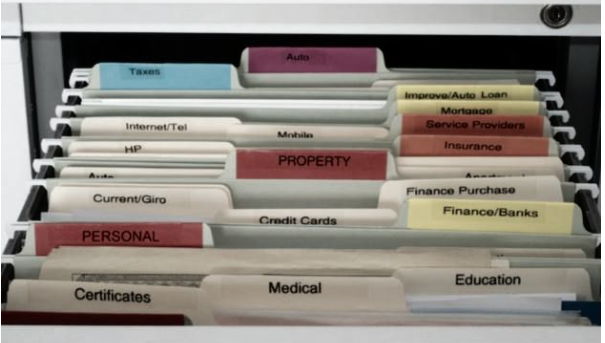The key to good document control is to know how long to keep them, how to securely store them and how to safely dispose of them.
In this edition, we look at documents to consider saving 3 years or more:
- Tax Returns (minimum three years and preferably seven years)
- Home Purchase Documents (seven years after selling your home)
- Home Capital Improvements (save as long as you own your home)
- Home & Product Warranties (keep until warranty expires)
- Investment Statements (save seven years after sale of investment)
- Insurance Policies (keep the most current until policy expires)
- Loans (keep most recent statement & paid-in-full doc for seven years)
- Medical Records (keep bills & insurance statements for five years from service provided)
- Retirement Documents (most recent Social Security, pension, health savings accounts, Medicare, etc.)
- Vehicle Documents (title, lease statement, paid-in-full doc, etc. until you no longer own the vehicle)
- Big Ticket Purchases (jewelry, furniture, computers, heirlooms, etc. in the event of insurance claims)
How to Store Your Documents
The choice to store documents digitally &/or physically is a matter of your comfort. It is also good to let a trusted source (like your spouse, children, or friend) know where to find these documents in case you are not able to access them.
Digital Storage Best Practices
- Have at least two secure copies via external hard drive, flash drive or cloud-based storage preferably with password protection either on the document itself or on the digital storage device.
- Have one scanned copy of physical documents like birth certificates similarly stored digitally.
- Always password protect any financial documents stored electronically.
- If stored on your computer, have documents encrypted as well as password protected.
- Remove outdated files on a quarterly or annual basis.
Physical Storage Best Practices
- Consider a secure filing cabinet, fireproof/waterproof lockbox, safe or safety deposit box.
- Categorize and label documents into logical files for ease of access.
- Remove and shred outdated files on a quarterly or annual basis.
OUR ADVICE
Always seek appropriate advice from your family, financial, legal and medical advisors. You can find more on federal tax recommendations at https://irs.gov.
Whatever your financial need, we're here to help.
